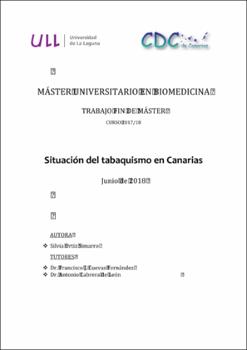Situación del tabaquismo en Canarias
Autor
Ortiz Simarro, SilviaFecha
2021Resumen
Objetivo: Describir el patrón de consumo de tabaco y sus efectos en una cohorte
canaria.
Métodos: estudio descriptivo observacional con datos procedentes de la cohorte “CDC
Canarias” en los años 2000, 2008 y 2015, en lo relativo al consumo de tabaco y algunas
enfermedades relacionadas.
Resultados: El consumo general de tabaco ha disminuido. La disminución es mayor en
hombres, aunque siguen fumando más que las mujeres. Por edad, jóvenes y medianos
fuman más que los mayores, pero han disminuido más su consumo. Entre clases
sociales la disminución es similar, con diferente prevalencia según edad y sexo: fuman
más los mayores de clase alta, las mujeres de clase alta y los jóvenes de clase baja. En
cuanto a los efectos nocivos observados, la población expuesta al humo pasivo del
tabaco tiene un riesgo ligeramente superior de padecer hipertensión arterial, y los
fumadores activos tienen un riesgo casi cinco veces superior de sufrir EPOC.
Conclusiones: La epidemia de tabaquismo en Canarias sigue una tendencia
descendente, igual que en otros países occidentales. El análisis de la evolución de
consumo permite identificar poblaciones diana que serán más susceptibles a
intervenciones sanitarias. Considerando el impacto de la intervención según el volumen
de afectados y las probabilidades de éxito, el grupo prioritario de intervención antitabáquica podría ser el de hombres jóvenes de clase social baja. Para caracterizar la
relación entre el tabaco y los efectos negativos para la salud de la población canaria
habría que plantear un estudio más exhaustivo. ABSTRACT.
Aims: to describe smoking patterns and health effects of tobacco use in the population
of the Canary Islands.
Methods: observational and descriptive study carried out with data from the cohort
“CDC Canarias in the years 2000, 2008 and 2015, regarding the consumption of
tobacco and some related diseases.
Results: Globally, cigarette consumption has decreased. Smoking prevalence reduction
is larger among men, but their prevalence is still higher than women. By age, young
people and middle-aged people smoke more than the older ones, but they show more
significant decline in their smoking prevalence. Among different social classes, tobacco
use has decreased in a similar way, with a different prevalence according to age and
sex: those who smoke the most are the older people from the upper, upper class women
and young people from the lower class. Regarding the adverse effects observed, the
population exposed to second-hand smoke has a slightly higher risk of suffering from
arterial hypertension, and active smokers have a risk almost five times higher to suffer
from chronic obstructive pulmonary disease.
Conclusions: Tobacco epidemic in the Canary Islands shows a downward trend, as in
many Western countries. The analysis of trends in smoking habits allows the
identification of target populations which can be the focus of health interventions.
Considering the impact of the intervention according to the volume of people affected
and the likelihood of success, the priority group of anti-tobacco intervention could be
young men from the lower social class. To characterize the relationship between
tobacco and its unhealthy effects in the population of the Canary Islands, a more
exhaustive study should be considered.





